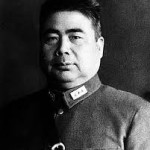 Feng Yuxiang (1882-1948, Wade-Giles: Feng Yu-hsiang) was a powerful military leader, variously known as the ‘Christian general’ or the ‘Christian warlord’. In political alignment with the Nationalists, Feng also served as the first vice premier of China under Jiang Jieshi. The son of a Qing officer, Feng followed his father into the military, enlisting in the army at 14 years of age. In 1902 he joined the modernised New Army. Nine years later Feng participated in the Xinhai Revolution, taking part in an anti-Qing rebellion in southern China and later enduring arrest and imprisonment. He was eventually released and returned to military service, however he opposed president Yuan Shikai’s attempt to restore the imperial monarchy. Feng converted to Christianity in 1914 and practiced it devoutly all his life. He attempted to spread his religious faith to the men in his command, combining modern military training with worship, Bible lessons and the singing of hymns. He was also known for ‘baptising’ entire troop companies with a fire hose.
Feng Yuxiang (1882-1948, Wade-Giles: Feng Yu-hsiang) was a powerful military leader, variously known as the ‘Christian general’ or the ‘Christian warlord’. In political alignment with the Nationalists, Feng also served as the first vice premier of China under Jiang Jieshi. The son of a Qing officer, Feng followed his father into the military, enlisting in the army at 14 years of age. In 1902 he joined the modernised New Army. Nine years later Feng participated in the Xinhai Revolution, taking part in an anti-Qing rebellion in southern China and later enduring arrest and imprisonment. He was eventually released and returned to military service, however he opposed president Yuan Shikai’s attempt to restore the imperial monarchy. Feng converted to Christianity in 1914 and practiced it devoutly all his life. He attempted to spread his religious faith to the men in his command, combining modern military training with worship, Bible lessons and the singing of hymns. He was also known for ‘baptising’ entire troop companies with a fire hose.
After the collapse of republican government in 1916 Feng operated as a warlord, albeit one with nationalist and republican sympathies. In 1924 he seized control of Beijing, cleared the Forbidden City of the former emperor Puyi and his retinue and invited Sun Yixian to return to the city to reestablish republican government. Feng’s troops later participated in the Northern Expedition (1926-28). The following year Feng was appointed as Jiang Jieshi’s war minister and vice premier. Feng, despite his warlord status, was more moderate than Jiang and he began to question the generalissimo’s policies and tactics. In 1930 Feng and other Guomindang leaders moved against Jiang and attempted to oust him from power. They were later defeated in the Central Plains War. Though he remained strongly critical of Jiang and his leadership, Feng led Nationalist military units during the anti-Japanese war. He died in Europe in 1948.
Information and resources on this page are © Alpha History 2018-23.
Content on this page may not be copied, republished or redistributed without the express permission of Alpha History. For more information please refer to our Terms of Use.
This website uses pinyin romanisations of Chinese words and names. Please refer to this page for more information.
